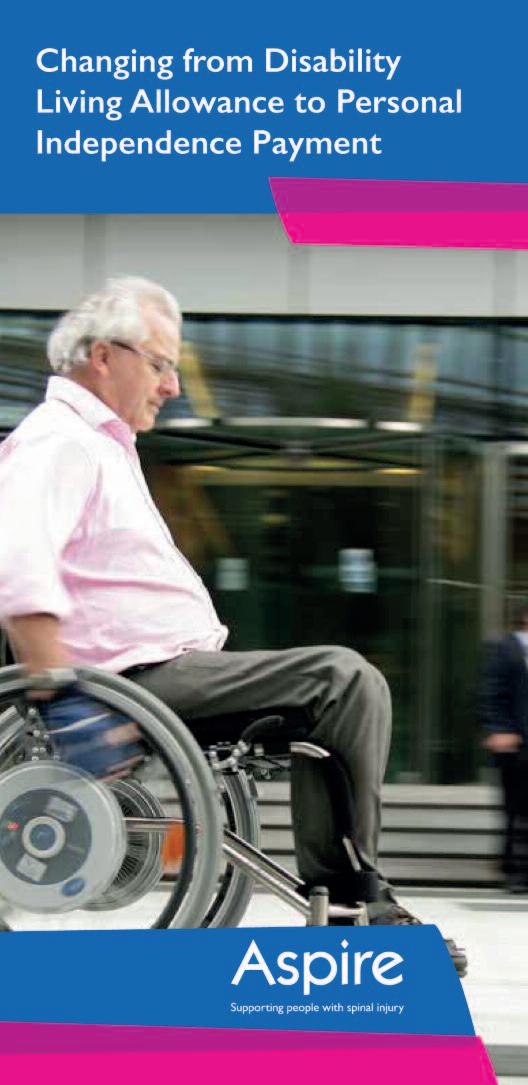
3 minute read
Making Changes
Our friends at Aspire have put together some useful tips and general information about changing from Disability Living Allowance (DLA) to Personal Independence Payment (PIP), the new benefit replacing DLA.
If you are in receipt of DLA you do not need to do anything until the Department for Work and Pensions (DWP) writes to you and invites you to make a claim for PIP. You will continue receiving DLA whilst you apply for PIP, as long as you follow the claims process.
Advertisement
Even if you have a lifetime DLA award, you will have to apply for PIP. If you were born before 8th April 1948 you won’t be affected by this change and you will continue to receive DLA.
There are four steps to making a PIP claim. This whole process can take up to 20 weeks from the initial phone call you make to start the claim to the DWP decision.
Step 1: Telephone call
Once you’ve received the letter from the DWP, you must call the PIP telephone claims line. You have to make this initial telephone call or, if someone else is making the call on your behalf, you need to be present.
You will need the following information when making this telephone call:
• Your full name and contact details (address and phone number)
• Your date of birth
• Your National Insurance number

• Your bank or building society account details
• Name and contact details of your GP or other health professional
• Information about time spent abroad for more than four weeks in the last three years
• Information about time spent in a care home or hospital now or previously
Keep a note of the date you make this telephone call on the back of this leaflet.
You should receive the PIP claims form to complete within 2 weeks of your phone call. If you do not receive it, call the DWP to chase them.
Step 2: Complete the form
Following your initial telephone call, the DWP will send you a 32 page PIP claims form to complete, known as PIP 2 or “How your disability affects you” You need to answer questions about how your spinal cord injury (and any other condition you might have) affects your daily living and mobility. You have to complete and return the form to the DWP within 4 weeks.

You can ask the DWP for more time if you need it.
The PIP claims form asks you to describe how you complete different daily tasks and about your ability to mobilise.
Each answer should include what help you need, how difficult it is to complete the task and if you are able to repeat it safely, to an acceptable standard, repeatedly and within a reasonable time period.
Further evidence
If you have written evidence to support your claim then it is important you send this to the DWP with your PIP claims form. For example, you can send copies of the following:
• A list of current prescribed medication and any side effects of these
• A diary of your typical week, including any fluctuation in conditions that affect you on ‘good and bad’ days
• A copy of your care plan
• A diary of illness or periods of illness and bed rest, example: pressure sores, UTIs, incidents of Autonomic Dysreflexia
• Any medical letter confirming your condition but not hospital appointment letters.
Do not pay for any medical or supporting evidence.
Step 3: Assessment phase
After you return your PIP claims form, the Assessment Provider, either ATOS or Capita, will produce a report for the DWP based on the information you gave or arrange for you to attend a face to face assessment to gather more information.
If it will be difficult for you to attend an assessment centre, you can request an assessment in your own home.
Someone can be with you for support during the face to face assessment.
Prepare for the assessment and write down any points that you think are important to mention. Failure to attend your assessment could jeopardise your claim.
Step 4: DWP decision
The Assessment Provider will send their report to the DWP. The DWP will write to you informing you of their decision.
The decision letter will state:
• Whether you are entitled to PIP
• Which components you are entitled to (daily living, mobility or both)
• Which level of each component you will receive (standard or enhanced)
If you are unhappy with the DWP’s decision, you can challenge it by requesting a mandatory reconsideration.
The DWP will then review your case and send you a DWP mandatory reconsideration decision letter.
If you are still unhappy with the decision you can appeal this through Her Majesty’s Courts and Tribunal Service.








